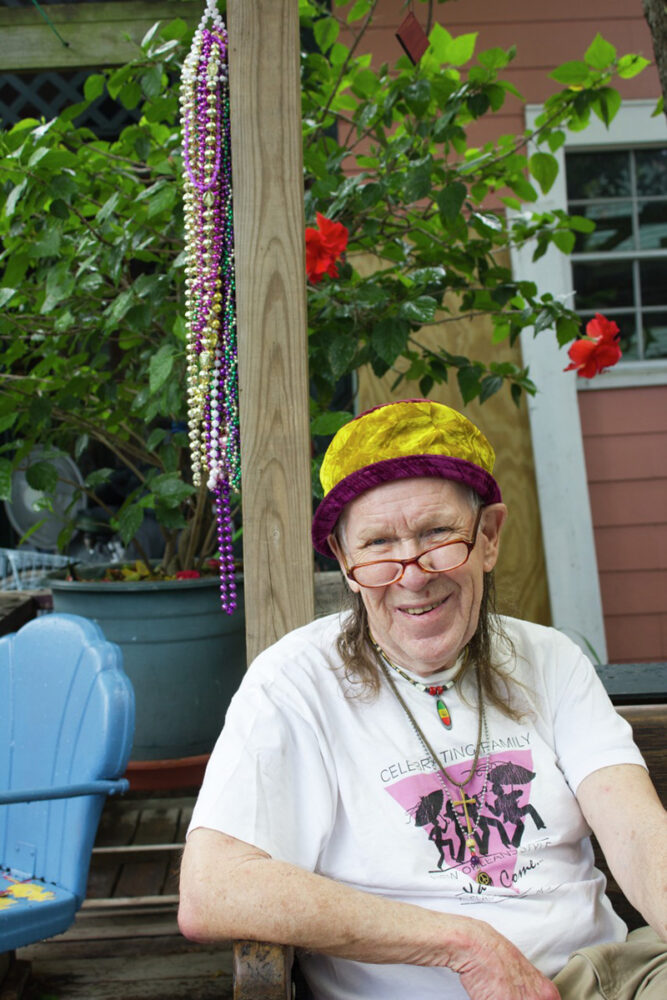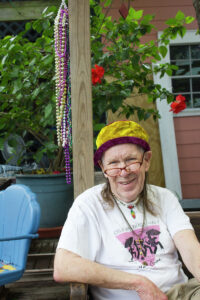Stewart Butler
Stewart Butler was a pioneering LGBTQ+ activist who made an impact across the state and nation.

The Historic New Orleans Collection
Stewart Butler, 2011.
Stewart Perry Butler was a pioneering LGBTQ+ activist based in New Orleans. His political activism on behalf of LGBTQ+ rights spanned over forty years and had an impact across the state and the nation. A survivor of the tragic Up Stairs Lounge fire in 1973, Butler went on to become a member or cofounder of several key organizations, including the Gertrude Stein Society, the Louisiana Lesbian and Gay Political Action Caucus (LAGPAC), Parents and Friends of Lesbians and Gays (PFLAG), the New Orleans LGBT Community Center, and the LGBT+ Archives Project of Louisiana.
Butler was born in 1930 in Mobile, Alabama, to Stewart Harrison Butler and Bertha June Perry. He was raised in New Orleans until he was twelve, when his father took a job at a leprosarium in Carville, Louisiana. Living at the leprosarium during his formative years taught Butler a lifelong lesson about the injustices of marginalization and fueled his fight against it. Butler attended Louisiana State University but did not graduate. He then joined the army and served four years before being honorably discharged and moving to Alaska. He graduated from the University of Alaska in 1958 with a bachelor of science degree in geological engineering and a bachelor of arts degree in business administration. He participated in the campaign for Alaskan statehood and became active in labor politics. He won election to the Alaskan territorial senate as a Democrat, but his election was nullified when Alaska gained statehood. Butler remained a Democrat for the rest of his life.
During his time in Alaska, Butler married a woman, Sophie Ondola, but the marriage lasted barely a year and ended in divorce. Butler had not yet come out of the closet, a fact that reflects the political climate of the time. An embryonic national gay movement had not yet fully coalesced and said movement would not become aligned with Democratic politics for years.
Butler lived briefly in San Francisco before returning to New Orleans in 1964. In 1973 he met his life partner, Alfred Doolittle. Doolittle was from a prominent San Francisco family and heir to a meatpacking and gold dredging fortune. Butler and Doolittle were at the Up Stairs Lounge in 1973 when an arsonist set fire to the bar, killing thirty-two people. The couple left the bar minutes before the fire was set. Butler and Doolittle were also at the Anita Bryant protest in Jackson Square in 1977. Bryant was a homophobic crusader and her visit to New Orleans sparked the first significant demonstration on behalf of LGBTQ+ rights in Louisiana.
When Doolittle inherited his fortune, he urged Butler to retire and become a full-time gay activist. The couple then purchased a home on Esplanade Avenue in 1978, which came to be known as the Faerie Playhouse. This home was the site of many organizational and planning meetings in the LGBTQ+ rights movement in the late twentieth and early twenty-first centuries. The cremains of several key activists are buried in the memorial garden behind the Faerie Playhouse. A commemorative plaque placed by the Bienville Foundation in 2007 adorns the front of the home.
In 1980 Butler became a charter member of the Louisiana Lesbian and Gay Political Action Caucus (LAGPAC). As its Membership Chair, Butler was instrumental in the growth of LAGPAC and was involved in the organization from its founding in 1980 to its dissolution in 2005. He also coordinated campaign strategy for political candidates who had been endorsed by LAGPAC. Butler’s most significant achievement with LAGPAC was his role in persuading the New Orleans City Council to adopt a non-discrimination ordinance to protect gay and lesbian people in 1991. In 1995 gender identity protections were added to the ordinance.
Butler was an early advocate for transgender rights. As a member of Parents and Friends of Lesbians and Gays (PFLAG), Butler and fellow trans advocate Courtney Sharp persuaded the New Orleans chapter of PFLAG to include trans people in its mission statement. They then turned their efforts toward the national PFLAG organization. In 1998 PFLAG became the first national lesbian and gay organization to include trans people in its mission statement. Butler also led efforts to convince other organizations to be trans inclusive. He and Doolittle also supported the New Orleans PFLAG Scholarship Fund, which became the model for the national PFLAG Scholarship Fund.
Butler advocated for other causes throughout his career. In the late 1980s and early 1990s he participated in several protests and demonstrations calling for more funding for HIV and AIDS medication and research, once even being arrested. He was also a strong voice for criminal justice reform, specifically calling for the legalization of marijuana and an end to the “war on drugs.”
In 2012 Butler began work on his last big project—the preservation of queer history. He co-founded The Legacy Project, which sought to capture oral histories. In 2013 The Legacy Project became the LGBT+ Archives Project of Louisiana, a statewide collective whose mission is promoting and encouraging the protection and preservation of materials that chronicle the culture and history of lesbian, gay, bisexual, and transgender communities in Louisiana. Butler remained on the board of directors for the LGBT+ Archives Project until his health began to fail in 2019. Stewart Butler died in his sleep on March 5, 2020.
